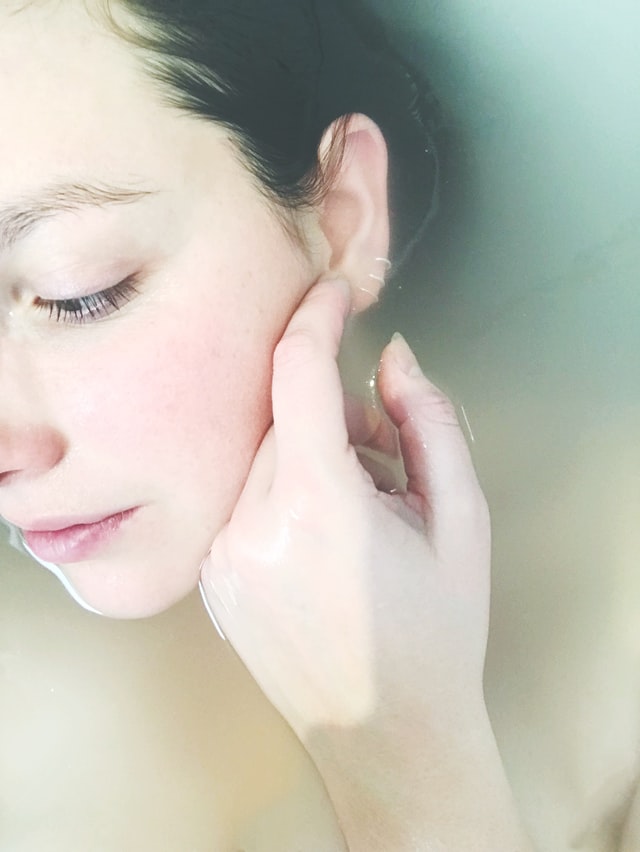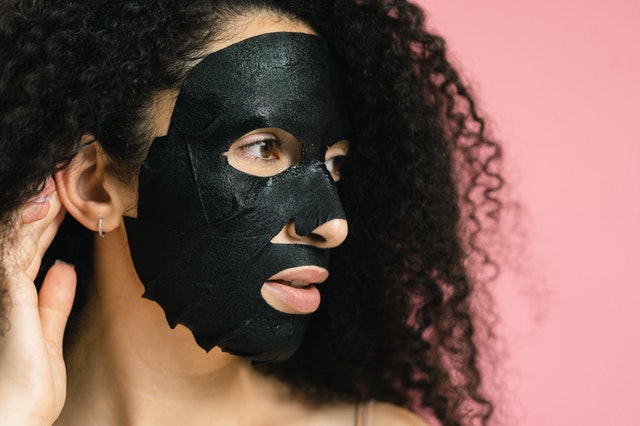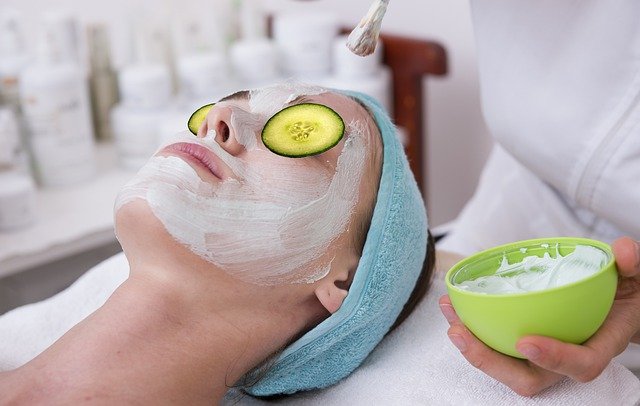Tackle acne scars naturally with these top tips. Start with aloe vera gel to soothe and reduce inflammation. Lemon juice acts as a natural astringent to lighten scars, while a honey and cinnamon mask boosts healing. Massage coconut oil in circular motions for its fatty acids and vitamins. Craft an apple cider vinegar toner for a gentle exfoliation. Turmeric's anti-inflammatory properties will even out skin tone. Use baking soda for a mild exfoliation, and apply rosehip seed oil for rejuvenation. Leverage green tea extract to calm and heal. There's a lot more to discover in perfecting your routine!
Aloe Vera Gel Application
Aloe Vera, a natural healing plant, is a powerful ally against acne scars. Its soothing gel is packed with vitamins, enzymes, and anti-inflammatory properties that can help reduce the appearance of scars and promote skin healing. To get started, select a fresh aloe vera leaf or use pure aloe vera gel from a reputable source. It is crucial to verify the gel is free from added chemicals or preservatives.
Begin by washing your face with a gentle cleanser, then pat it dry. Apply a thin layer of aloe vera gel directly onto the scarred areas. You'll want to massage it gently in circular motions, allowing the skin to absorb its nutrients. Leave the gel on for about 30 minutes before rinsing it off with lukewarm water. For best results, repeat this process twice daily—morning and night.
Regular application helps to hydrate your skin, reducing redness and gradually fading acne scars. Remember, consistency is key. By incorporating aloe vera into your skincare routine, you're providing your skin with a natural, effective treatment that supports healing and rejuvenation, helping you achieve clearer, smoother skin over time.
Lemon Juice Spot Treatment
Lemon juice, a natural astringent, is known for its ability to lighten scars and even out skin tone. If you're looking to fade acne scars, a lemon juice spot treatment can be an effective solution. Start by squeezing fresh lemon juice into a small bowl. Make sure your face is clean and dry before applying. Use a cotton swab or a clean fingertip to dab the juice directly onto the scars. Be precise, as lemon juice can be drying and you don't want to irritate healthy skin.
Leave the lemon juice on your skin for about 10 minutes. During this time, you may feel a slight tingling sensation; that's normal. However, if you experience burning, wash it off immediately. After 10 minutes, rinse your face with lukewarm water and gently pat it dry with a towel.
Don't forget to apply a moisturizer afterward, as lemon juice can dry out the skin. Also, always use sunscreen if you're heading outdoors, as lemon juice can increase your skin's sensitivity to sunlight. Use this treatment two to three times a week for best results, but be careful not to overdo it.
Honey and Cinnamon Mask

While searching for a natural remedy to fade acne scars, consider trying a honey and cinnamon mask. This combination is not only simple but also effective. Honey is renowned for its antibacterial and healing properties. It moisturizes your skin, reducing redness and swelling often associated with acne scars. On the other hand, cinnamon has anti-inflammatory properties that can help reduce the appearance of scars by promoting blood circulation to the skin.
To create this mask, mix two tablespoons of honey with one teaspoon of cinnamon powder until it forms a smooth paste. Before applying, clean your face thoroughly to remove any dirt or oils. Then, gently spread the mixture over your face, focusing on areas with acne scars. Leave the mask on for about 10 to 15 minutes, and then rinse it off with warm water. Pat your skin dry with a soft towel.
Using this mask regularly, about two to three times a week, can help fade scars over time. Remember, consistency is key. With patience, you may notice a gradual improvement in your skin's texture and tone. Give this natural remedy a try and enjoy a more radiant complexion.
Coconut Oil Massage
If you're looking for another natural way to fade acne scars, consider incorporating a coconut oil massage into your skincare routine. Coconut oil is packed with vitamins and fatty acids that can nourish your skin and promote healing. It's known for its anti-inflammatory and antibacterial properties, making it an excellent choice for reducing scar appearance.
To start, choose a high-quality, organic coconut oil. Scoop a small amount into your palm and let it warm up until it becomes a liquid. Gently massage the oil onto your scars using circular motions. This not only helps the oil penetrate your skin but also stimulates blood circulation, which can aid the healing process. Aim to do this for about 5-10 minutes daily for the best results.
Apple Cider Vinegar Toner

Apple cider vinegar is a powerful natural remedy for fading acne scars. It's rich in acetic acid, which helps exfoliate and rejuvenate your skin. When you use it as a toner, it can lighten scars and promote skin healing. To make an apple cider vinegar toner, mix one part vinegar with two parts water. This dilution guarantees it's gentle enough for your skin while still being effective.
After cleansing your face, apply the toner using a cotton ball or pad. Gently swipe it over your skin, focusing on areas with acne scars. You'll want to let it dry naturally, allowing your skin to absorb its beneficial properties. Apple cider vinegar balances your skin's pH levels, reducing redness and minimizing the appearance of scars.
Consistency is key. Use this toner daily, and you'll notice improvements over time. If your skin feels sensitive, reduce the vinegar concentration or limit usage to a few times a week. Remember, always do a patch test before applying it to your face to avoid any adverse reactions. With patience and regular use, apple cider vinegar can be a valuable ally in your quest for clearer skin.
Tea Tree Oil Therapy
Often celebrated for its antimicrobial properties, tea tree oil is an effective natural treatment for reducing acne scars. When you apply it correctly, it can help diminish the appearance of scars by promoting healthy skin regeneration. Make sure to dilute it before use, as undiluted tea tree oil can be harsh on the skin.
To start, mix a few drops of tea tree oil with a carrier oil, such as coconut or jojoba oil, to prevent irritation. Using a cotton swab, gently dab the mixture onto your scars. Do this once or twice daily, depending on your skin's sensitivity. Over time, you'll notice a reduction in the redness and texture of your scars.
Consistency is key. Don't expect overnight miracles, but with regular application, you'll start seeing gradual improvement. Keep an eye out for any adverse reactions, like redness or itching, and discontinue use if necessary.
Aside from its scar-fading abilities, tea tree oil helps keep your skin clear by targeting bacteria that can lead to breakouts. This dual action makes it a valuable addition to your skincare routine, helping you achieve smoother, clearer skin without harsh chemicals.
Turmeric Paste Remedy

Renowned for its anti-inflammatory and antioxidant properties, turmeric paste is a natural remedy that can help fade acne scars. You can easily prepare a turmeric paste at home, making it a cost-effective and simple option for improving your skin's appearance. By applying this magical spice, you can reduce redness and lighten dark spots over time. Here's how you can make the most of turmeric's benefits for your acne scars.
To create your turmeric paste, mix turmeric powder with a few drops of water or honey until it forms a thick paste. Honey is especially beneficial as it adds moisture and enhances the paste's antibacterial properties. Apply the mixture directly to your scars, leaving it on for 15 to 20 minutes before rinsing off with lukewarm water.
Enjoy These Benefits:
- Natural Brightener: Helps in evening out skin tone and reducing hyperpigmentation.
- Anti-inflammatory Action: Soothes the skin and reduces redness associated with acne scars.
- Antioxidant Boost: Protects the skin from free radicals, promoting healthier skin regeneration.
Remember to perform a patch test before using turmeric paste to verify you don't have any adverse reactions. With consistency, you'll start seeing improvements in your skin's texture and tone.
Baking Soda Exfoliation
Exfoliating your skin with baking soda can be a simple yet effective method for fading acne scars. Baking soda acts as a gentle exfoliant, helping to remove dead skin cells and promote new skin growth. This process can gradually reduce the appearance of scars over time.
To use baking soda for exfoliation, start by mixing a small amount of baking soda with water to form a thick paste. Apply the paste to your cleansed face, gently massaging it in circular motions. Focus on areas with acne scars, but avoid applying too much pressure. The goal is to exfoliate without irritating your skin.
After about one to two minutes of massaging, rinse your face thoroughly with lukewarm water. Pat your skin dry with a clean towel. It's important to follow up with a good moisturizer to keep your skin hydrated and balanced. You can repeat this process two to three times a week, depending on your skin's sensitivity.
Rosehip Seed Oil Use

Rosehip seed oil's rich profile makes it a valuable ally in fading acne scars. It's packed with essential fatty acids and vitamins like A and C, which help rejuvenate your skin and improve its texture. Applying rosehip seed oil can reduce the appearance of scars and promote a more even skin tone. It's lightweight and absorbs quickly, making it suitable for all skin types. Plus, it won't leave a greasy residue, so you can use it both morning and night.
To get the most out of rosehip seed oil, follow these simple steps:
- Cleanse your skin: Start with a clean face. Use a gentle cleanser to remove dirt and impurities.
- Apply the oil: After cleansing, take a few drops of rosehip seed oil and gently massage it into your skin, focusing on the scarred areas.
- Be consistent: Use the oil daily for the best results. Consistency is key in seeing improvements over time.
Incorporating rosehip seed oil into your skincare routine can be a game-changer. It not only aids in fading scars but also nourishes and hydrates your skin, leaving it looking healthier and more radiant.
Green Tea Extract Benefits
While rosehip seed oil works wonders on acne scars, another powerful natural remedy to contemplate is green tea extract. This potent antioxidant is packed with polyphenols that help reduce inflammation and promote skin healing. You might not know it, but green tea extract can greatly lighten acne scars and even skin tone over time.
When you apply green tea extract topically, it works to reduce sebum production, which can lead to fewer breakouts and allow existing scars to fade more effectively. The catechins in green tea are known for their antibacterial properties, helping to ward off acne-causing bacteria. By addressing the root cause, you're setting the stage for clearer, smoother skin.
To incorporate green tea extract into your routine, look for skincare products like serums or creams that list it as a key ingredient. You can also DIY by steeping green tea bags, allowing them to cool, and then dabbing the liquid onto your scars. Consistency is key, so stick with it and monitor your skin's progress. You'll likely notice not only fading scars but also a healthier, more radiant complexion.
Frequently Asked Questions
How Long Does It Typically Take to See Results From Natural Remedies?
When using natural remedies, you'll typically start seeing results in about four to eight weeks. Consistency's key, so don't skip applications. Everyone's skin is different, so patience and persistence will help you achieve the best outcome.
Can These Remedies Be Used on All Skin Types?
You'll find that most natural remedies can be used on all skin types, but it's essential to patch test first. This way, you guarantee they don't cause irritation or adverse reactions before applying them widely.
Are There Any Side Effects to Using Natural Acne Scar Treatments?
You've got to watch for potential side effects, even with natural treatments. Allergic reactions, irritation, or increased sensitivity can occur. Always test a small area first and consult with a dermatologist if you're unsure.
Can These Natural Methods Be Combined With Medical Treatments?
You can totally become the ultimate skin magician by combining natural methods with medical treatments. Just consult your dermatologist first, ensuring your skin doesn't react like it's auditioning for a fireworks show.
How Often Should These Natural Remedies Be Applied for Best Results?
You should apply these natural remedies consistently, about two to three times a week, for ideal results. Don't overdo it, as your skin needs time to heal and adjust to the treatments you've chosen.
At a Glance
You've got all these natural remedies at your fingertips, so why not give them a try? With aloe vera's soothing touch or the brightening power of lemon juice, you're well-equipped to tackle those pesky acne scars. Remember, consistency is key, and patience is your best friend. Who doesn't love the idea of radiant, scar-free skin without resorting to harsh chemicals? Immerse yourself, explore, and watch your skin transform with these simple, effective solutions.






